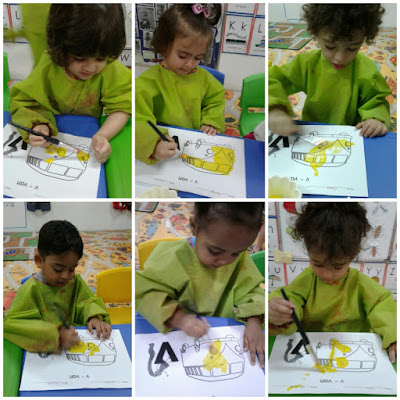SONG OF THE YEAR
UAE National Anthem
SONGS OF THE WEEK
Arabic Song
اطفال ياحلوين اشربوا الحليب
To listen to the song of the week for our Babies, kindly click on the link below:
Ten Little Fingers
To listen to the song of the week for our Playgroup I, kindly click on the link below:
Hurry, Hurry Drive the Police car
To listen to the song of the week for our Playgroup II, kindly click on the link below:
Miss Polly Had a Dolly
To listen to the song of the week for our Foundation Year, kindly click on the link below:
Construction Machines
OUR BABIES
Babies learn by using their senses. They explore and discover by
touching and mouthing objects, hearing voices and music, and seeing the
colorful, fascinating wonder all around them. In the first year, babies
are learning very important concepts. They learn about cause and affect when
they shake a rattle and hear a sound, or when they pull out tapes from the
floor. They learn about size and shape by stacking blocks, mouthing them, and
trying to fit them into the correctly-shaped holes. They learn to solve
problems when they discover how to turn the crank to get the jack-in-the-box to
pop up. They learn about gravity when they drop a spoon from the high chair and
look down to the floor to see where it lands. They learn object permanence—that
things they can’t see still exist—when they play peek-a-boo or crawl into the
next room to find you. It's through interactions and experiences with
loved and trusted adults that babies begin to make sense of the world. We support
baby’s thinking skills by encouraging them to explore in a safe, healthy
environment.
















OUR PLAYGROUP I
Toddlers are little scientists. They are eager to figure out how
everything works. They do this through “experiments.” They might throw a ball
to the ground and see that it bounces, and then throw a doll to see what it
will do. They also learn to use objects as tools—for example, using a stick to
try to get an out-of-reach toy. Their growing memory takes on an important role
in helping them learn. They
begin using their new physical skills, strength, and coordination to conduct
“experiments” on the new ideas and concepts they are learning. They may stack
blocks up in a teeter tower just to see how high it can get before they knock
it down. Or, they may practice pouring and filling in the bathtub, which
requires a steady hand and lots of hand-eye coordination. We understand the importance of nurturing
your child’s growing thinking skills, and create lots of chances for your toddler to “test out” the new ideas and
concepts they are learning.
















OUR PLAYGROUP II
At this stage, children are making a huge leap in their thinking skills
as they are now able to use their imagination and develop lots of their own
ideas. They start to appreciate humor and jokes. They are able to come up with solutions
to more complex challenges. As children get closer to age 3, they begin to
understand how things are logically connected; for example, that you need to
eat in order to grow. They use their increasing language skills to ask
questions about what they see, hear, and experience in the world. That’s the
reason it seems that every other word 2-year-olds speak is “Why?” The ability
to think logically—to put 2 and 2 together—is critical for thinking through
problems and being successful in school and life. At this stage, we give a lot of importance to
build children’s imagination. We watch them and see what they are
interested in, ask questions, motivate them to think and offer lots of chances
to explore in creative way.











































OUR FOUNDATION YEAR





















































Children are keen observers
and are learning how to apply what they observe. In this age-group, children
enjoy experimenting with a wide variety of materials and they develop their
problem-solving skills through trial and error. Problem-solving often
comes from a state of wonder. What does a kindergartner wonder about? They
wonder about how things work, how they go together, and how to take them apart.
They think about where things come from and how they grow and change. They're curious
about what they can do with their bodies and with their imaginations. Each of
these wonderments leads to problem-solving adventures that help children
construct their own knowledge about how the world works. They engage in elaborate pretend play, experiment
with cause and effect in play, understands basic concepts like tallest,
biggest, same, more, etc., ask who, what, where, and why questions, understand more
complex words like time words (yesterday, tomorrow) and words to describe
emotions (happy, disappoint). We create a
state of wonder for children by asking lots of open-ended questions and promoting
brainstorming to foster
critical and creative thinking, inviting
children to use materials in new ways , and turning their mistakes into learning experiences.

























































































































No comments:
Post a Comment